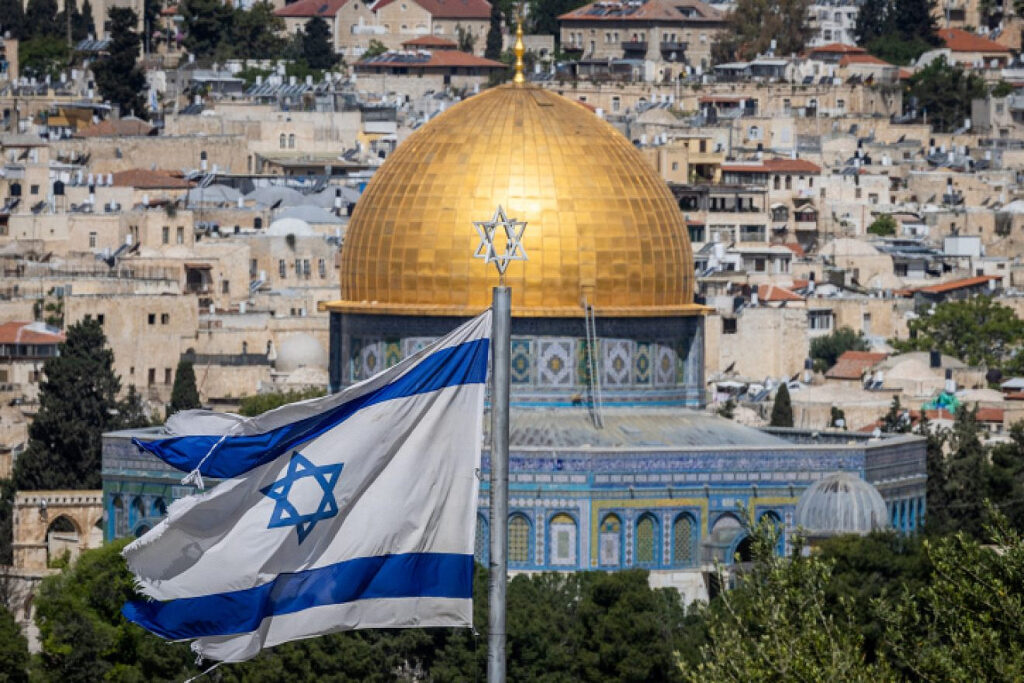For several years, Saudi Arabia has been signaling to Jordan that it intends to replace Amman as custodian of Jerusalem’s Temple Mount.
By Baruch Yedid, TPS
The timing was not accidental when Saudi Arabia announced over the weekend that its ambassador to Jordan will also take on the roles of ambassador to the Palestinian Authority and consul general in eastern Jerusalem.
The announcement came days after The Wall Street Journal reported that U.S. and Saudi officials have agreed on the general outlines of an agreement for Riyadh to normalize relations with Israel. The White House then downplayed the idea that Riyadh had agreed to the “broad contours” of a normalization deal.
Although Israeli Foreign Minister Eli Cohen on Sunday quickly shot down the idea of a Saudi consulate for the Palestinians in eastern Jerusalem, Saudi and Palestinian officials said, “The Saudi move is an indication of the possibility of an agreement to normalize relations between Israel and Saudi Arabia soon and is a signal to the entire region.”
But Saudi and Palestinian officials also said, “Saudi Arabia wishes to signal to Jordan that it considers itself entitled to set foot in the al-Aqsa mosque in east Jerusalem, which would make the crown prince and the Al Saud dynasty responsible for the three holy places of Islam: Mecca, Medina and al-Aqsa.”
Saudi sources stressed that the religious issue is critical in the eyes of the royal palace, which must deal with a large group of Saudi princes and dignitaries who do not look favorably on Crown Prince Mohammed bin Salman’s pivot towards the West.
For several years, Saudi Arabia has been signaling to Jordan that it intends to replace Amman as custodian of Jerusalem’s Temple Mount.
Since the Six-Day War of 1967, the day-to-day administration of the Temple Mount has been overseen by the Islamic Waqf, a religious trust, while Israel is responsible for security. However, the Israel-Jordan peace treaty of 1994 placed the Waqf under the purview of the Jordanian monarchy. As custodian of the Temple Mount, the Jordanian monarchy funds the Waqf and appoints its leadership.
Encroachment in Jerusalem
Palestinian Authority President Mahmoud Abbas visited Jordan’s King Abdullah in Amman on Tuesday. According to Arab reports, the two men discussed their concerns about what they consider Saudi encroachment in Jerusalem.
A Waqf official warned, “The Jordanian weakness since King Abdullah ascended to the throne [in 1999] is being exploited by the Muslim Brotherhood and by their main patrons, Qatar and Turkey, and it is not liked by the Saudis, who tend to interfere in the management of the holy place for Muslims.”
The source added that both the Waqf and the PA are “concerned” and “disturbed” with the way Abdullah treats his position as custodian of the Temple Mount and his “lack of vigorous action” over the holy sites.
“Unlike his father, King Hussein, [Abdullah] transferred the al-Aqsa case to other officials at home. The monarchy is unable to be a significant authority vis-à-vis the Muslim Brotherhood and the Turks, which led to the weakening of the Waqf.”
During Ramadan, which overlapped with the week-long Passover holiday, Palestinians, incited by Sheikh Raed Salah of the Muslim Brotherhood-aligned Northern Branch of the Islamic Movement in Israel, barricaded themselves inside the Al-Aqsa mosque. Israeli officials had appealed to Amman not to allow Palestinians to spend the night in the mosque, given the security tensions at the time.
The source also said that “in response to this, officials from eastern Jerusalem previously turned to the Saudis so that they would act as a counterweight to Turkey, which is operating in the Old City and in the holy places.”
The Israel-Turkey diplomatic thaw is paving the way for the Turkish Cooperation and Coordination Agency (TIKA) to resume its efforts to undermine Israeli sovereignty in eastern Jerusalem and boost Turkish influence in the city.
The Saudis are seeking American security guarantees regarding Iran and advanced weapons and US assistance to develop a civilian nuclear program.
Sources close to the Saudi and Israeli leadership have made conflicting comments on Palestinian linkage.
According to the Gulf sources, the Saudis are conditioning normalization with progress on the Palestinian front, but the Israeli sources say Riyadh has made no such stipulations.


